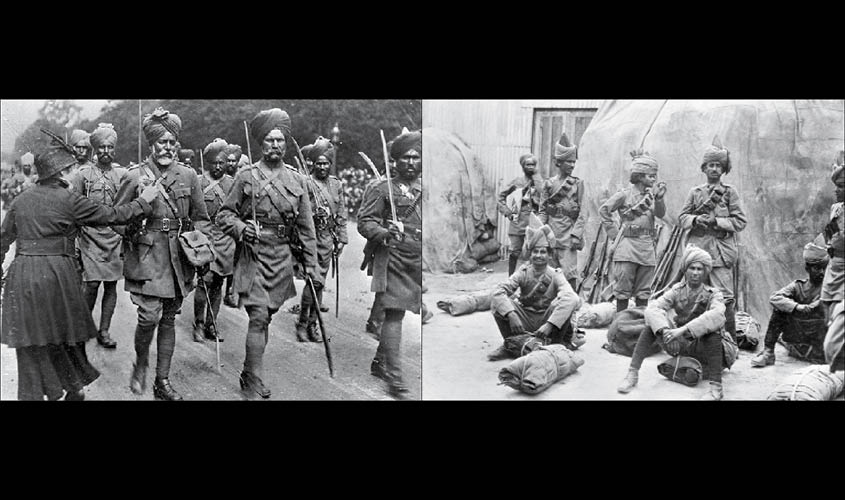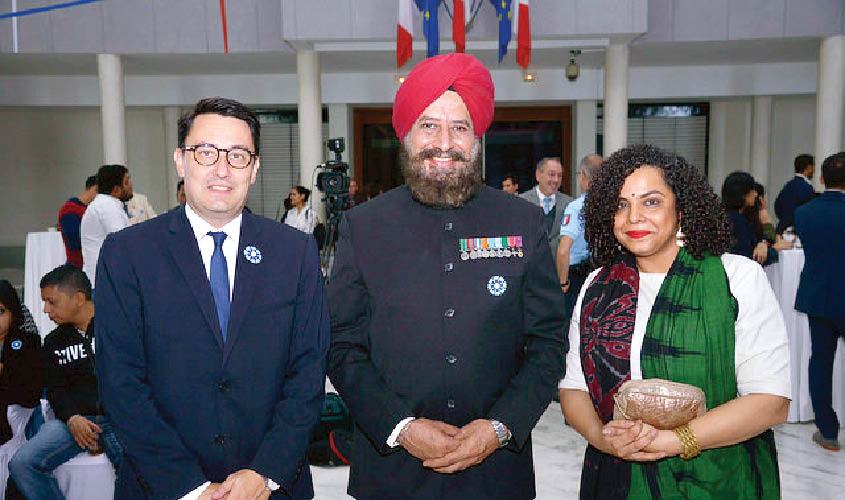Over a million soldiers who fought on Britain’s side in the First World War were recruited from India. Yet the story of their valour and sacrifice has long been forgotten, writes Utpal Kumar.
Historian E.H. Carr, in his seminal book What is History?, calls history “a continuous process of interaction between the historian and his facts, an unending dialogue between the past and the present”. Yet, in India, it’s assumed to be a sacred truth, a constant phenomenon not to be touched or tampered with. It’s this extreme, excessive sensitivity that bars any meaningful dialogue with the past.
So, when journalist Mandakini Gahlot’s documentary, The Forgotten Army, showcased at the Embassy of France in New Delhi on Tuesday, looks back at a stellar role played by Indian soldiers during World War I, one is tempted to ask: Why is the Great War’s overriding image always that of the Tommy? Why hasn’t its India story ever been told to us in schools and colleges? How can the nation ignore the participation of its many Indian soldiers, especially when they shaped the fate of the war?
“Over a hundred years ago, nearly 1.5 million men from across India were recruited to fight in the Great War. Hailing from different parts of the country, they fought in every major theatre of the war in Europe, the Middle East and Africa, and nearly 75,000 among them lost their lives,” informs Gahlot whose great-grandfather, Risaldar Major Hari Singh, was among the Indian men who had fought the war.
Led by military historian Rana Chhina, whose own grandfather served at that time in East Africa, the documentary takes us through rural Punjab, where descendants recall stories of ancestors long gone. It then tracks the bloodied battlefields of France and Belgium, where many Indians had made supreme sacrifices, and the educational institutions of England, where researchers are busy connecting the missing dots in the Great War’s India story.

“This work of keeping memory alive is crucial. It is our way out of barbarism. Today, we are not celebrating a victory, but only peace. And we have to remember that peace is fragile and that the assaults of nationalism, of lethal ideology, that destroyed so many lives during the 20th century are not only part of our history,” says Alexandre Ziegler, the French Ambassador to India.
The arrival of Indian troops turned the fortune in favour of the British Empire. “The Indians arrived in the nick of time, when the British troops were exhausted in the first weeks of warfare. The armies from Canada, Australia and New Zealand were still on their way. It fell on the Indian soldiers to hold the position. The Germans would have reached the ports, were it not for them,” says Shrabani Basu, the author of For King and Another Country: Indian Soldiers on the Western Front.
This being not India’s war, some people describe Indian soldiers as mercenaries, indicating that money was their sole motive. But given their valour, stoicism and discipline against the Germans, world’s best-equipped army then, within a month of landing in Marseilles, France, in 1914, the argument
seems hollow.
“They went into the trenches in their cotton khakis, amid extremely cold conditions,” reminds Gahlot. Also, to their disadvantage, the concept of trench warfare and chemical weapons were alien to Indians. Basu adds another handicap. “The Indian Army had been supplied with Lee Enfield Rifles Mark II, but the British Army had Mark III models. The soldiers were now given the new model, but they had little time to train as they were needed in the trenches,” she elaborates.
Yet, the Indians fought well and won admiration even from their enemies. “Today for the first time we had to fight against the Indians and the devil knows these brown rascals are not to be underrated… truly these brown enemies are not to be despised,” Basu quotes a German soldier telling a newspaper.
In his book, Indian Voices of the Great War, British historian David Omissi quotes a Garhwali subedar writing to his friend in India, “Think it’s a great honour that we have an opportunity of showing our loyalty to our great Emperor by the sacrifice of our bodies and by the favour that is accorded to us of being present on the field of battle… It’s a noble fate for us to be allowed to sacrifice our bodies for
our King.”
Such was their valour that soldiers from the subcontinent won 11 Victoria Crosses, including the first awarded to a British Indian Army soldier, Khudadad Khan. Yet, hardly anyone remembers their sacrifices. What explains such indifference?
It can be understood from political developments soon after the Great War. Indian politicians led by Mahatma Gandhi had overwhelmingly supported Britain’s war efforts, in the hope that India’s demand for home rule or dominion status would be favourably looked upon. When that did not happen, there was an overwhelming sense of dejection and anger which got aggravated after the Jallianwalla massacre in Punjab in 1919.
What could have further added to the amnesia was the great Nehruvian distrust for the Army. One just needs to look at Jawaharlal Nehru’s interactions with the military leaders in the 1950s and the early 1960s. He had a lot of misgivings for the generals and at times even questioned the rationale of having a standing army. This also explains why INA soldiers, who had participated in India’s freedom struggle, too were at the receiving ends.
Chhina provides another reason. “The memory of those soldiers who had served in the now-discredited empire was all but lost in the post-colonial world. The lack of political identity in 1915 thus served to rob Indian soldiers not just of an acknowledgement of their role, or a commemoration of their sacrifice, but also of their place in
history.”
Basu adds to this when she says, “In post-Independence India, the soldiers who had fought for their colonial masters were no longer worthy of commemoration.”
Things are changing for the better, though. “The new generation is now, thankfully, moving away from such colonial obsessions. This will help correct the mistakes committed in the past,” signs off Chhina.

